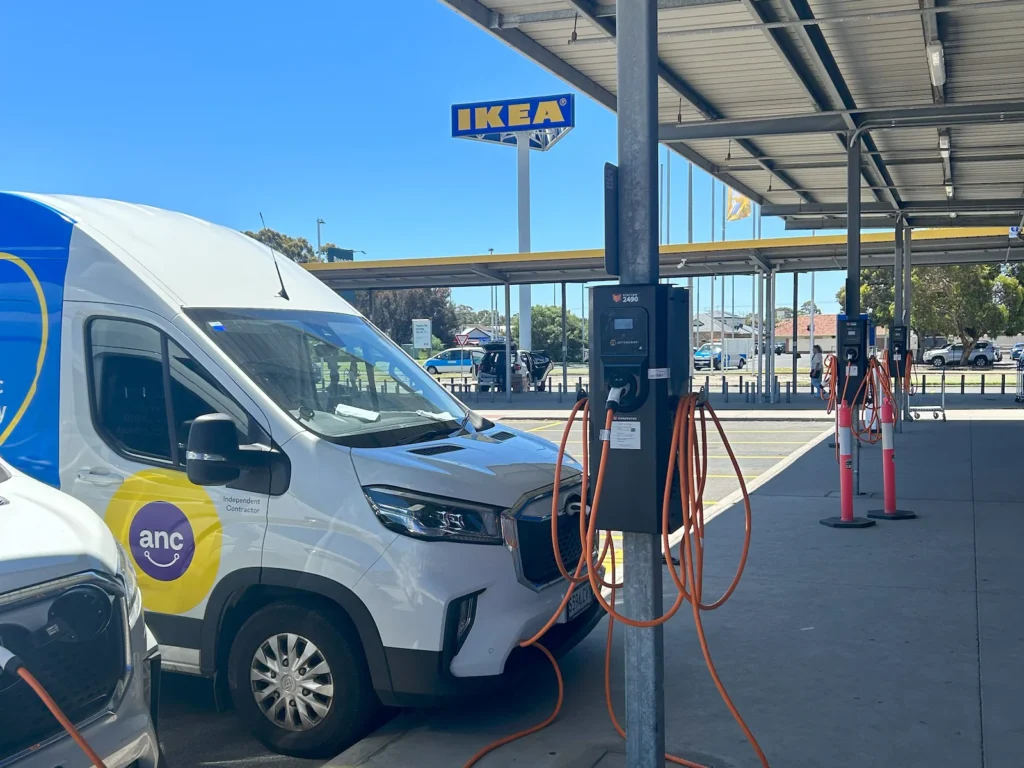Collaborating with its delivery partners and other key stakeholders has been critical to ensuring home furnishings retailer IKEA Australia is on track to meet its ambitious goal of 100 per cent zero-emissions truck deliveries by 2025.
In electrifying addresses to close out the final day of Australia’s largest-ever transport decarbonisation event, TruckShowX, IKEA Australia Zero Emissions Delivery Lead Alexandra Kelly and All Purpose Transport CEO Paul Kahlert shared some of the “creative” and “out of the box” thinking that has overcome key challenges in the EV transition.
With accessibility of urban charging infrastructure a frequent challenge for logistics providers, Kelly says IKEA recognised the need to invest in charging infrastructure to support its delivery partners. It recently committed $4.5 million to rollout dedicated electric chargers for delivery partner fleets in all its stores across the country.
Kelly says the investment represents a major step forward by a retailer that will support the road freight logistics sector to decarbonise.
In partnership with JET Charge, there will be electric charging and energy management systems installed for six vehicles at each of the 10 IKEA stores around Australia, plus charging for 28 vehicles at its Central Distribution Centre warehouse in Sydney’s Marsden Park, providing drivers with accessible, low-cost charging for a range of electric delivery vehicles.
IKEA deliveries are carried out by delivery partners, including All Purpose Transport in Queensland, ANC in Victoria and Kings Transport in NSW, each with their own network of truck and van drivers, who are working together with IKEA to transition to zero-emissions delivery by 2025.
As public charging infrastructure caters to passenger vehicles only, this investment will support these delivery drivers with access to low-cost charging infrastructure for their vehicles.
The new electric chargers are a mix of AC and DC charging options to cater to the different needs of IKEA delivery partners’ trucks and vans, with 22kW and 20kW for overnight charging, and 75kW and 150kW for fast charging, as well as the JET Charge CORE energy management system which allows energy to be intelligently controlled within the site.
The installation project being carried out by JET Charge is currently under way and is expected to be completed by the end of 2024.

At a global level, IKEA has committed to drastically reducing greenhouse gas emissions. In 2019, IKEA became the first home furnishing retailer in Australia to use electric vehicles for home deliveries and assembly services. As of May 2024, IKEA Australia hit a new milestone, with 40 per cent of truck deliveries to customers now made via a fleet of 51 zero-emissions vehicles.
“We have made exciting progress with electrifying our fleet, especially in the last 12 months, but we know a significant barrier for our delivery partners being able to make the switch to an electric vehicle is limited access to charging infrastructure,” Kelly says.
“By investing in national network of dedicated chargers for electric trucks and vans at all IKEA sites, we are providing access to electric charging at the point of fulfilment where orders are being picked up.
“With the support of innovative partners like JET Charge, we hope to address key challenges like this for the freight and logistics sector.
“Supporting our delivery partners to electrify sees us move closer to our overall goal of 100 per cent zero-emissions truck deliveries at IKEA Australia, but more importantly, we believe it can also help drive further positive change we want to see in the industry as an investment in the future of last mile delivery.”
Collaborating on innovative solutions has also been critical to overcoming another key challenge – the high cost of EVs compared to their diesel equivalents, especially for delivery partners reliant on small subcontractors.
Convincing owner-drivers to purchase “new tech” for up to $180,000 was a “hard sell”, All Purpose Transport’s Paul Kahlert concedes and required some “creative” and “out of the box” thinking.
Kahlert, in his address to TruckShowX, says APT created a “narrative” for its zero-emissions story based on the business’s “family-first values”.
This centred on promoting the benefits of removing CO2-emitting diesel vehicles from the communities its contractors’ families live in – and which contribute to asthma, allergies and respiratory illnesses.